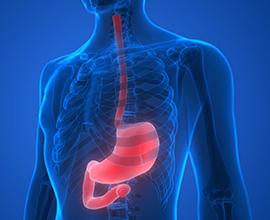What is Gastroscopy?
Gastroscopy is an endoscopy test to examine the oesophagus (food pipe), stomach and the upper part of the small bowel. A gastroscopy is carried out using a thin, flexible tube known as a gastroscope. It is an Outpatient test which is very quick usually lasting 5 minutes, although cases requiring treatment may take slightly longer. Following the procedure, you may be advised to stay in hospital for up to 2-3 hours after the procedure.

Indications for Gastroscopy
A gastroscopy might be recommended to investigate the following symptoms:
- Anaemia (low blood levels)
- Difficulty swallowing (dysphagia)
- Abdominal pain
- Chest pain (atypical) that isn’t caused by heart-related conditions
- Nausea and vomiting
- Unexplained weight loss
- Vomiting blood
- Persistent diarrhoea
- Blood in your stools
- To check for inflammation/ulcers
- To check for h pylori infection
- To check for coeliac disease
Alternatives to Gastroscopy
Gastroscopy is an incredibly safe and relatively simple test. A barium meal is a non-invasive alternative, however, this is less accurate at detecting inflammation, ulcers and cancers. Also, it involves radiation and does not allow for samples or biopsies to be taken during the procedure, nor the administration of therapy.
Preparing for Gastroscopy
It is important that the stomach is empty to enable a safe and optimal examination and allow the upper gastrointestinal tract to be viewed clearly. Therefore, you should avoid eating or drinking anything for at least 6 hours before the procedure.
Medication Advice
Usual medications can be continued up till the procedure, however, specific precautions may be taken in some cases. If taking any blood-thinning drugs (e.g. Clopidogrel, warfarin, apixaban), it is particularly important to discuss these with Dr Goel or your nurse beforehand so appropriate advice can be given. In some cases the accuracy of the test (such as checking for the presence of Helicobacter Pylori) may be affected by certain medications particularly antibiotics and antacid treatments, such as omeprazole (Losec), pantoprazole (Protium) and ranitidine (Zantac). Please discuss this with Dr Goel or your nurse in advance of your test and also mention any allergies you may have beforehand.
The Gastroscopy Procedure
Upon your arrival, you will be greeted by a member of staff who will help you prepare for your procedure. Your nurse may ask you a few pre-assessment questions and you should inform them of your medications, allergies and any potential concerns. Patients with false teeth will be asked to remove them temporarily for the procedure. The procedure starts with Dr Goel spraying your throat with a local short-acting anesthetic spray to gently numb the throat. You may also be given an intravenous sedative to help you relax and may make you feel drowsy or sleepy. A nurse will stay with you throughout the procedure and a small device will monitor your breathing and pulse. A small mouthpiece will be placed between your teeth to keep your mouth open and the endoscope will then be passed down the throat and into the stomach. This does not affect your breathing and should be painless but can be slightly uncomfortable. Some patients may gag or retch slightly which is quite normal. To feel most comfortable, try not to talk during the test and to focus on breathing slowly through your nose. In some cases, a biopsy may be taken from the lining of the stomach which is quite routine. If necessary, small instruments may also be passed through the endoscope, for example, to stretch (dilate) a narrowed area, remove polyps (usually benign growths) and treat bleeding points.
Sedation and Anaesthesia
A gastroscopy can be performed using a throat spray local anaesthetic alone or in combination with an intravenous sedative. Patients may choose sedation at it can make the procedure more comfortable and reduces anxiety. Sedation often makes you drowsy after the procedure and you will require an escort to take you home. You will have the opportunity to discuss your preference with Dr Goel before your procedure. Following the procedure, Dr Goel will explain the results of your procedure and answer any questions you may have. It is always advisable to arrange a follow-up appointment to discuss findings (and any awaited biopsy results), particularly if you are tired and drowsy following the procedure as you may not recall what is said. You will be monitored in a recovery bay until the medication has worn off. After sedation, you should avoid driving or operating heavy machinery for 24 hours after the procedure. Your escort will be asked to accompany you home when you are ready to leave the department. Sedation is very safe, however, there is a very small risk of over-sedation and with any medication there is a small risk of side-effects. If you have a throat spray local anaesthetic, you may experience greater discomfort during the procedure but you can resume normal activities straight away.
After the Gastroscopy Procedure
After the procedure, your throat may feel a little sore and you may feel slightly bloated from air introduced into the stomach during the test. This usually passes within a few hours and you can eat and drink as normal after around 1 hour. However, if you begin to experience severe pain or experience any bleeding, you should see an emergency doctor right away.
Risks of Gastroscopy
Fortunately, complications are very rare and the test is very safe. The overall complication rate is approximately 1 in 10000 cases. Possible complications include damage to dental work, drug allergies, making a small hole in the gastrointestinal tract (perforation), bleeding and over-sedation. The test can be more stressful for patients with heart or lung disease and this should be discussed with Dr Goel beforehand. Dr Goel will always ensure any investigation is safe and appropriate for you. Any risks of the procedure will be discussed with you and you will be fully informed beforehand.


